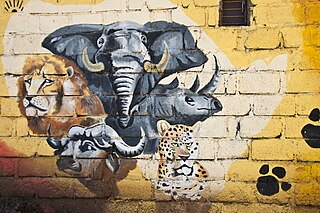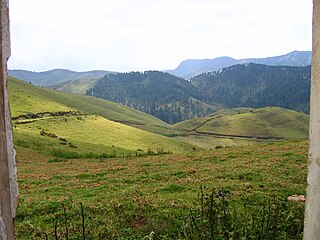Related Research Articles

In Africa, the Big Five game animals are the lion, leopard, black rhinoceros, African bush elephant, and African buffalo. They are examples of charismatic megafauna, featuring prominently in popular culture, and are among the most famous of Africa's large animals. The term was coined by big-game hunters, and refers to the five most difficult animals in Africa to hunt on foot but is now more widely used by game viewing tourists and safari tour operators.

The African palm swift is a small swift. It is very similar to the Asian palm swift, Cypsiurus balasiensis, and was formerly considered to be the same species. The Malagasy palm swift was also recently split from this species. This is a common species with a very wide distribution which faces no obvious threats and may be increasing in numbers as a result of the cultivation of the exotic Washington palm, so the International Union for Conservation of Nature has rated its conservation status as being of "least concern".

Great Limpopo Transfrontier Park is a 35,000 km² peace park that is in the process of being formed. It will link the Limpopo National Park in Mozambique, Kruger National Park in South Africa, Gonarezhou National Park, Manjinji Pan Sanctuary and Malipati Safari Area in Zimbabwe, as well as the area between Kruger and Gonarezhou, the Sengwe communal land in Zimbabwe and the Makuleke region in South Africa.

Kgalagadi Transfrontier Park is a large wildlife preserve and conservation area in southern Africa.

Eros Airport or Windhoek Eros Airport is an airport serving Windhoek, the capital and largest city of Namibia. It is located in the Khomas Region, about 5 km (3 mi) south of Windhoek's central business district and was a secondary hub for Air Namibia.
Norman Joseph Carr, MBE was a British conservationist working in Central and Southern Africa. He was influential in setting up National Parks in Malawi (Nyasaland), Zambia and Zimbabwe (Rhodesia) in the 1950s and 1960s. In Zambia, his vision of Conservation through Tourism led him to set up the country's first safari company, Norman Carr Safaris, with a focus on local employment and empowerment. He is widely regarded as the pioneer of walking safaris as part of non-consumptive tourism in Africa.

Kasane International Airport is an airport serving Kasane, a town in the Chobe District of Botswana. The airport is located along the A33 Road, 4 kilometres (2.5 mi) south of the town and 4 kilometres (2.5 mi) south of the border with Namibia.

Sioma Ngwezi National Park is a 5,000-square-kilometre park in the south west corner of Zambia. It is undeveloped and rarely visited, lacking roads and being off the usual tourist tracks, but this may change in the future.

The green-capped eremomela or greencap eremomela is a species of bird formerly placed in the "Old World warbler" assemblage, but now placed in the family Cisticolidae.

The black coucal is a species of cuckoo in the family Cuculidae. It has a wide distribution in Africa south of the Sahara.

The copper sunbird is a species of passerine bird in the family Nectariniidae. It is native to tropical Africa, its range extending from Senegal and Guinea in the west to South Sudan and Kenya in the east, and southwards to Angola, Zambia, Zimbabwe and Mozambique.

The three-banded courser is a species of bird in the family Glareolidae. It is found in Angola, Botswana, Ethiopia, Kenya, Namibia, Rwanda, Somalia, Somaliland, South Africa, South Sudan, Tanzania, Uganda, Zambia, and Zimbabwe.

Gishwati Forest is a forest in the north-western part of Rwanda, not far from Lake Kivu. It is part of Gishwati–Mukura National Park. The area's forests were largely intact in 1978, and substantial forest cover still remained in 1986. During the Rwandan genocide, wave after wave of refugees arrived in Gishwati Forest and began clearing it, often for subsistence farming. By 2001, only a small circular patch of native forest remained, 1,500 acres (6.1 km2) of the forest’s original 250,000. In addition to tremendous loss of biodiversity, the region experiences soil erosion and degradation and landslides. Reforestation efforts in the past few years have increased the remnant native forest to about 2,500 acres (10 km2). Large tea estates occupy the central and northern parts of the reserve.

The Africa Women's Sevens is the continental championship for women's international rugby sevens in Africa. The tournament sanctioned and sponsored by Rugby Africa which is the rugby union governing body for the continent.

Tourism is an important economic sector for many countries in Africa. There are many countries that benefit heavily from tourism like Uganda, Algeria, Egypt, South Africa, Kenya, Morocco, Tunisia, Ghana and Tanzania. The touristic particularity of Africa lies in the wide variety of points of interest, diversity and multitudes of landscapes as well as the rich cultural heritage. Also, an ecotourist industry is present in some African countries.

Bwabwata National Park is a protected area in northeastern Namibia that was established in 2007 and covers 6,274 km2 (2,422 sq mi). It was created by merging Caprivi Game Park and Mahango Game Reserve. It is situated in the Zambezi and Kavango East regions, extending along the Caprivi Strip. It is bounded by the Okavango River to the west and the Kwando River to the east. Angola lies to the north and Botswana to the south.

Visitors to Zambia must obtain a visa from one of the Zambian diplomatic missions unless they come from one of the visa exempt countries or countries whose citizens are eligible for visa on arrival. Visitors may alternatively obtain an electronic visa. All visitors must hold a passport valid for at least 6 months. As of November 2014 Zambia and Zimbabwe also offer a universal visa.

Visitors to Zimbabwe must obtain a visa from one of the Zimbabwean diplomatic missions or online unless they come from one of the visa exempt countries or are eligible for visa on arrival. As of November 2014 Zimbabwe and Zambia also offer a universal tourist visa.
Atlas Mara Limited, formerly referred to as Atlas Mara Co-Nvest Limited, is a financial services holding company formed to undertake the acquisition of target banks in Africa.

The Southeast African cheetah is the nominate cheetah subspecies native to East and Southern Africa. The Southern African cheetah lives mainly in the lowland areas and deserts of the Kalahari, the savannahs of Okavango Delta, and the grasslands of the Transvaal region in South Africa. In Namibia, cheetahs are mostly found in farmlands. In India, four cheetahs of the subspecies are living in Kuno National Park in Madhya Pradesh after having been introduced there.
References
- ↑ Benza, Brian (8 June 2012). "Billionaire family ups stake in Wilderness Safaris". MmegiOnline. Dikgang Publishing Company. Retrieved 1 November 2014.
- ↑ "Wilderness Safaris IPO to hoist Botswana's image". Sunday Standard. 7 March 2010. Retrieved 1 November 2014.
- ↑ "WILDERNESS SAFARIS' NEW CAMP IN RWANDA: MAGASHI". Hideaway Report. 8 March 2019.
- ↑ Ho, Lauren. "Chikwenya Mana Pools National Park, Zimbabwe". The Telegraph.
- ↑ Siting and design of hotels and resorts: principles and case studies for biodiversity conservation. IUCN. 2012. pp. 28–30. ISBN 978-2831714714 . Retrieved 1 November 2014.
- ↑ "Travel with Purpose with Wilderness Safaris – Hwange Elephant Collaring". African Travel & Tourism Association. 17 April 2019.